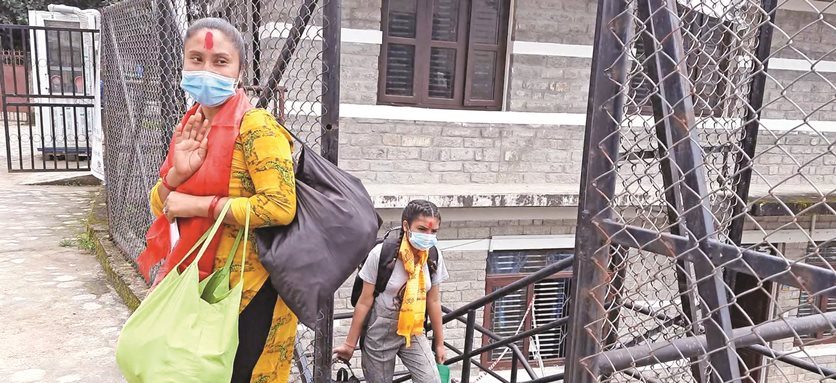One can beat virus, but it’s harder to beat social stigma

By Kailash Lama
Charikot, Sept. 5: Phulpaki Pangju Tamang, a health worker of the health post located Bhimeshwor Municipality-2, had possibly contracted the novel coronavirus infection from her work place, as she has always been in the frontline in the battle against the pandemic.
A day before she tested positive for COVID-19, she was busy taking care of the patients with her colleagues. Even, on August 26, the day when she received her Polymerase Chain Reaction (PCR) test report, she was working in her farmland.
“I was completely stunned to know that I had tested positive for COVID-19. I thought that my chances of contracting the virus was relatively low as I had no symptoms,” said Tamang
“Never had I anticipated the amount of bitterness that was coming towards me and my family when I tested positive for the virus,” she added.
As soon as she received the information, the news had already spread in her neighbourhood and she was portrayed as if she was culprit. Her neighbours did not hesitate to blame her for bringing the disease to the village.
“Till then, I was completely devastated. But fortunately, I was asymptomatic and none of my family members had contracted COVID-19. However, being a healthcare professional, I consoled myself that I will beat this disease,” shared Tamang.
Tamang finally won her battle against the virus and she shared that her willpower helped her overcome the disease.
Although she had won her battle against the disease, the fear and stigma have badly devoured Tamang and her family. She and her family have been struggling against the stigmatisation they have been facing in the neighbourhood.
Tamang, who was discharged from the isolation centre on Wednesday along with eight other patients, said that her fight against the social stigma would be much longer than her battle against the virus.
Wiping her tears, Tamang said, “Since I tested positive, the villagers have barred my family from fetching water from the public tap. My mother was not even allowed to buy salt from the local shop.”
“If anyone happens to meet my family members on their way, they will either change their direction or will run away,” she lamented. “The stigmatisation is more deadly than the virus itself. COVID-19 has been like a punishment for me and my family. If the infection doesn’t kill you, the stigma will.”
Like Tamang, her colleague Bindiya Shrestha of Charikot, Bhimeshwor Municiplaity-3, has similar tale to share.
After Tamang had tested positive for the COVID-19, Shrestha also decided to undergo PCR test.
Ever since her swab sample was collected for the test, her neighbours had started behaving unusually.
“After my colleague tested positive for the virus, my family meticulously abided by self-isolation measures,” Shrestha shared.
“They treated me, my in-laws and my children as criminals. Even before the result arrived, they behaved with us like we were untouchable. My children were not even allowed to play with their kids. People have even stopped using the road that goes through my house.” she said.
The result took almost seven days to come. Some even blamed my family for hiding the report, she added.
The result was finally out on Wednesday and Shrestha tested negative for the virus. “I am no more scared of the virus. The only thing I am worried now is the amount of bitterness that will come in the way of people infected with the virus.”
As the country is battling with the COVID-19 pandemic, Nepal has been reporting rising number of health care professionals being infected with the virus.
The current virus outbreak has provoked social stigma and discriminatory behaviours against infected.
Like, Tamang and Shrestha, many COVID-19 patients have shared their worries that in an outbreak, people are being labeled, stereotyped, discriminated, treated separately, leading to experiencing loss of status in the society because of perceived link with the disease.
They shared that such treatment could affect those with the disease, as well as their family and the whole community.
There are altogether 31 COVID-19 patients in Dolakha but fortunately none of them have shown severe symptoms. Of them, 18 infected have been discharged, said the District Health Office, Dolakha.
Recent News

Do not make expressions casting dout on election: EC
14 Apr, 2022
CM Bhatta says may New Year 2079 BS inspire positive thinking
14 Apr, 2022
Three new cases, 44 recoveries in 24 hours
14 Apr, 2022
689 climbers of 84 teams so far acquire permits for climbing various peaks this spring season
14 Apr, 2022
How the rising cost of living crisis is impacting Nepal
14 Apr, 2022
US military confirms an interstellar meteor collided with Earth
14 Apr, 2022
Valneva Covid vaccine approved for use in UK
14 Apr, 2022
Chair Prachanda highlights need of unity among Maoist, Communist forces
14 Apr, 2022
Ranbir Kapoor and Alia Bhatt: Bollywood toasts star couple on wedding
14 Apr, 2022
President Bhandari confers decorations (Photo Feature)
14 Apr, 2022











